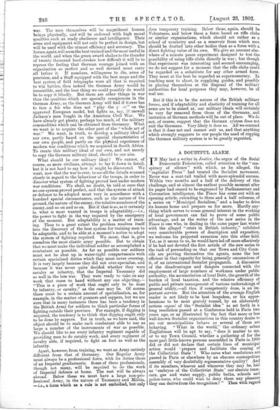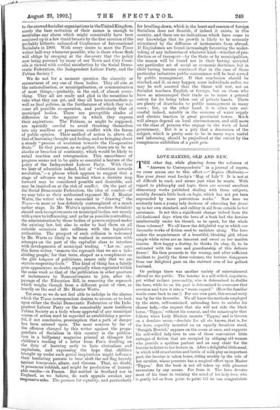A DOITBT.h UL ALARM.
IN May last a writer in Justice, the organ of the Social Democratic Federation, called attention to the " con- spiracy of silence " with which, as he alleged, the " capitalist Press " had treated the Socialist movement. Never was a coat-tail trailed with more splendid success. Within two months and a half of the delivery of this challenge, and at almost the earliest possible moment after its pages had ceased to be engrossed by Parliamentary and Coronation intelligence, the Times has come out with an opening article, extending to three and a half columns, of a series on " Municipal Socialism," and a leader to drive its lessons home and prepare us for more. Hardly any- thing which serves to rouse general interest in the working of local government can fail to prove of some public advantage, and as the writer of the new series in the Times is one who, in dealing in the same paper last winter with the alleged " crisis in British industry," exhibited very considerable powers of description and exposition, we welcome his projected excursion into this other field. Yet, as it seems to us, he would have led off more effectively if he had not devoted. the first article of the new series to the task of persuading us that our Town and City Coun- cils are proving themselves the agents, none the less efficient in that capacity for being generally unconscious of it, of an international Socialist propaganda. A discussion of the disadvantages and dangers connected with the employment of large numbers of workmen under public authority, the accumulation of local Debt, the growth of the burden of local taxation, and the relative efficiency of public and private management of various undertakings of general utility,—all this, if competently done, is an im- portant service. But the attention of the average English reader is not likely to be best bespoken, or his appre- hensions to be most gravely roused, by an elaborately serious expose of the " Socialist idea " as set forth in a long resolution passed at a Conference held in Paris two years ago, or as illustrated by the fact that more or less well-known Socialist organisations in this country desire to see our municipalities behave as several of them are behaving. " What in the world," the ordinary urban Englishman will be apt to say, " does it matter to me, or to my Town Council, whether a gathering of for the most part little-known persons assembled in Paris in 1900 did or did not declare that certain lines of municipal action would prepare and facilitate the coming of the Collectivist State ' ? Who cares what resolutions are passed in Paris or elsewhere by an obscure cosmopolitan assembly of very doubtfully representative quality? And if its members, whoever and wherever they may be, hail as embryos of the Collectivist State' our electric tram- cars, gas and water supply, public baths, schools and police-force, who could wish to deny them any pleasure they can derive from the recognition ? " Then with regard to the avowed Socialist organisations in theUnitedKingdom, surely the bare recitation of their names is enough to neutralise any alarm which might conceivably have been conjured up in a few timid breasts by the first mention of the probably hitherto unheard-of Conference of International Socialists in 1900. With every desire to meet the Times writer half-way whenever possible, who is there whose flesh will oblige by creeping at the discovery that the policy now being pursued by many of our Town and City Coun- cils is viewed with cordial satisfaction by the Social Demo- cratic Federation, the Independent Labour Party, and the Fabian Society ?
We do not for a moment question the sincerity or earnestness of any one of these bodies. They all aim at the nationalisation, or municipalisation, or communisation of most things,—probably, in the end, of almost every- thing. They all are ready and glad in the meantime to take what they can get, and they all have intermediate as well as final policies, in the furtherance of which they wel- come all possible co-operation, and particularly that of municipal bodies. There are perceptible shades of difference in the manner in which they express their aspirations. The Fabians, as might be supposed, are specially careful to avoid throwing themselves into any needless or premature conflict with the forces of public opinion. Their method of action is, above all, that of leavening thought and feeling, and so bringing about a steady " process of evolution towards the Co-operative State." In that process, as we gather, there are to be no shocks or breaches of continuity, which would be likely to entail reaction and retrogression. This smoothness of progress seems not to be quite so essential a feature of the policy of the Independent Labour Party. With them we hear of education indeed, but of " education towards revolution,"—a phrase which appears to suggest that a stage of advance may be reached when a decisive leap forward may be considered possible and desirable, and may be insisted on at the risk of conflict. On the part of the Social Democratic Federation, the idea of combat—if we may take as their authorised exponent Mr. J. Hunter Watts, the writer who has succeeded in " drawing " the Times—is more or less definitely contemplated at a much earlier stage. In Mr. Watts's opinion, resolute Socialists should seek to capture seats on municipal bodies, not merely with a view to influencing, and as far as possible controlling, the administration by those bodies of powers enjoyed under the existing law, but also in order to lead them on all suitable occasions into collision with the legislative authorities. The prospect of such collision is welcomed by Mr. Watts as likely to be realised in connection with attempts on the part of the capitalist class to interfere with developments of municipal trading. " Let us," says this fierce writer, "remove the reproach that we are a 'law- abiding people,' for that term, shaped as a compliment on the glib tongues of politicians, means only that we are statute-respecting fools." This kind of thing has a faintly grim appearance, no doubt, especially when reprinted within the same week as that of the publication in other quarters of incitements to Nonconformists to join, after the passage of the Education Bill, in removing the reproach which weighs, though from a different point of view, so heavily on the soul of Mr. Hunter Watts.
Yet even so we do not feel able to indulge in the alarms which the Times correspondent desires to arouse, or to look upon either the Social Democratic Federation or the Inde- pendent Labour Party or the conceivably more insidious Fabian Society as a body whose approval of any municipal course of action need be regarded as establishing a power- ful, if not conclusive, presumption that a path of danger has been entered upon. The most noxious by far of the offences charged by this writer against the propa- gandists of Socialism in this country is the publica- tion in a halfpenny magazine printed at Glasgow for children's reading of a letter from Paris dwelling on the duty of learning early to hate clericalism and capitalism, and expressing the hope that children brought up under such genial inspirations might influence their hesitating parents to bear aloft the red flag bravely against bourgeoisie, altars, and thrones. That, no doubt, is poisonous rubbish, and might be productive of lament- able results—in France. But neither in Scotland nor in England, as we believe, do such appeals awaken any responsive echo. The passion for equality, and particularly for levelling-down, which is the heart and essence of foreign Socialism does not flourish, if indeed it exists, in this country, and there are no indications which have come to our knowledge that its growth is likely to be seriously stimulated by the diffusion of incitements from abroad. If Englishmen are found increasingly favouring the under- taking of any industries of whatever kind—whether of pro- duction or of transport—by the State or by municipalities, the reason will be found not in their having accepted any particular set of social or economic doctrines, but in their having become convinced that in the case of those particular industries public convenience will be best served by public management. If that conclusion should be reached, and if, as may happen, some individuals suffer, we may be well assured that the blame will rest., not on Socialist teachers, English or foreign, but on those who have so mismanaged their trade as to rouse a general outcry for its being taken out of private hands. Theri3 are plenty of drawbacks to public management in many cases ; but, on the other hand, it is often very suc- cessful indeed, notably in the systems of water supply and electric traction in great provincial towns. Much will always depend on local circumstances, and still more on the class of persons who engage in the work of local government. But it is a pity that a discussion of the subject, which is pretty sure to be in many ways useful and informing, should be prejudiced at the outset by the conspicuous exhibition of a parti prig.







































 Previous page
Previous page